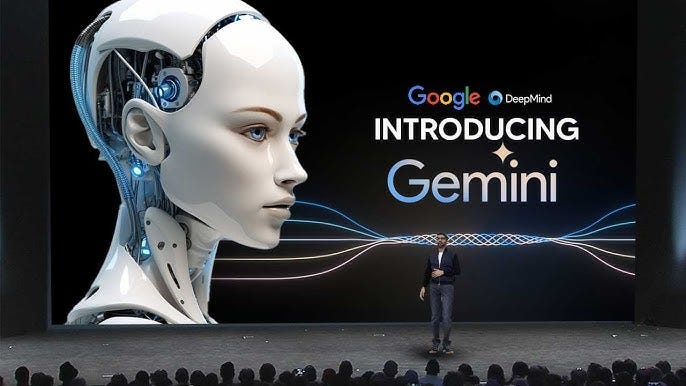In the dynamic world of artificial intelligence (AI), breakthroughs continue to shape our technological landscape. Among these innovations stands Gemini, an AI model developed by Google that has garnered significant attention within the tech community. In this exploration, we delve into the nuances of Gemini, its comparison with established models like GPT-4, and its potential implications for the future of AI.
Understanding Gemini: A Peek into Google’s Innovation
Google Gemini represents a remarkable advancement in AI research and development. Built upon the foundation of deep learning and neural networks, Gemini is engineered to understand and generate human-like text with exceptional accuracy and fluency. Its architecture, grounded in complex algorithms and vast datasets, enables it to grasp intricate linguistic nuances and produce contextually relevant responses.
The Birth of Gemini: Origins and Growth
Gemini’s journey traces back to Google’s relentless pursuit of AI excellence. Stemming from the successes of previous models like GPT-3, Google aimed to push boundaries further by enhancing language comprehension and generation capabilities. Through iterative refinement and meticulous experimentation, Gemini emerged as a formidable contender in natural language processing (NLP).
Google Gemini vs. GPT-4: A Comparative Exploration
A burning question surrounding Gemini pertains to its standing in comparison to existing AI models, particularly GPT-4. While both models excel in language tasks, they exhibit distinct differences in architecture, performance, and underlying principles.
Architecture and Design: Gemini sets itself apart with an innovative architecture emphasizing hierarchical structure and attention mechanisms for improved contextual understanding. In contrast, GPT-4 relies on a transformer-based architecture, albeit with refinements to enhance efficiency and scalability.
Performance and Accuracy: Initial assessments suggest that Gemini demonstrates superior performance in certain tasks, particularly those requiring nuanced comprehension and responses. However, the degree of superiority varies across different evaluation metrics and datasets.
Scalability and Adaptability: Both Gemini and GPT-4 showcase remarkable scalability, enabling them to handle increasingly large and diverse datasets. Nevertheless, Gemini’s modular design offers greater flexibility for fine-tuning and adaptation to specific use cases.
Unveiling Gemini’s Features: Driving Innovation Forward
Gemini boasts a plethora of features that distinguish it as a groundbreaking AI model with diverse applications across various domains. Notable features include:
1. Multimodal Integration: Gemini excels in integrating information from multiple modalities—text, images, and audio—to generate coherent and contextually rich responses. This capability proves invaluable in scenarios requiring multimodal understanding, such as virtual assistants and content generation platforms.
2. Contextual Adaptation: Leveraging advanced attention mechanisms, Gemini can adapt its responses based on contextual cues and user interactions. This enables more dynamic and personalized interactions, enhancing user engagement and satisfaction.
3. Continual Learning: Gemini is equipped with continual learning capabilities, enabling it to assimilate new information and adapt its models in real-time. This ensures that Gemini remains up-to-date and responsive to evolving trends and preferences.
4. Ethical AI Principles: Google has prioritized ethical considerations in Gemini’s development, incorporating safeguards to mitigate biases and promote responsible AI usage. This includes rigorous testing, transparency in model behavior, and mechanisms for addressing unintended consequences.
Applications of Gemini: A Versatile Tool for Various Industries
Gemini’s versatility extends across a wide spectrum of industries and applications, revolutionizing how businesses and organizations leverage AI for various tasks. Notable applications include:
1. Conversational Interfaces: Gemini powers next-generation conversational interfaces, facilitating seamless interactions between humans and machines. From chatbots to virtual assistants, Gemini’s natural language understanding capabilities enhance user experiences and streamline communication channels.
2. Content Generation: Content creators and marketers benefit from Gemini’s ability to generate high-quality, contextually relevant content at scale. Whether writing product descriptions, generating blog posts, or crafting personalized emails, Gemini offers a valuable tool for content generation and optimization.
3. Healthcare Informatics: In the healthcare sector, Gemini facilitates advanced medical informatics and decision support systems. By analyzing patient data, medical literature, and diagnostic images, Gemini assists clinicians in diagnosis, treatment planning, and patient care management.
4. Financial Analysis: Financial institutions leverage Gemini for predictive analytics, risk assessment, and algorithmic trading. Its ability to process and interpret vast amounts of financial data enables more accurate forecasting and informed decision-making in dynamic market environments.
Challenges and the Road Ahead
Despite its groundbreaking capabilities, Gemini faces challenges and limitations. Addressing issues such as model bias, data privacy, and ethical concerns remains crucial to ensuring responsible AI deployment. Furthermore, ongoing research and development efforts are needed to enhance Gemini’s robustness, scalability, and generalization across diverse domains and languages.
Conclusion: The Era of Gemini
In conclusion, Google Gemini represents a significant milestone in the journey of artificial intelligence. With its innovative features, diverse applications, and ethical foundations, Gemini paves the way for AI-driven transformation across industries and domains. As researchers and practitioners continue to explore its capabilities and implications, the future of AI shines bright, propelled by the pursuit of knowledge and technological innovation.





